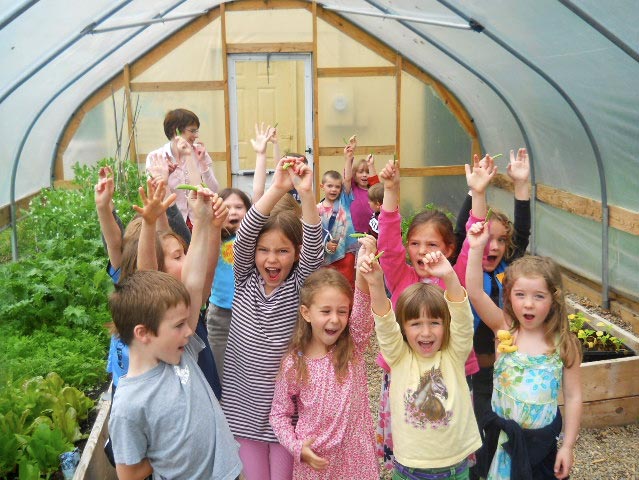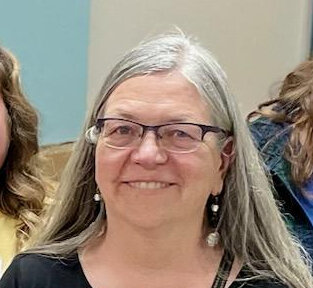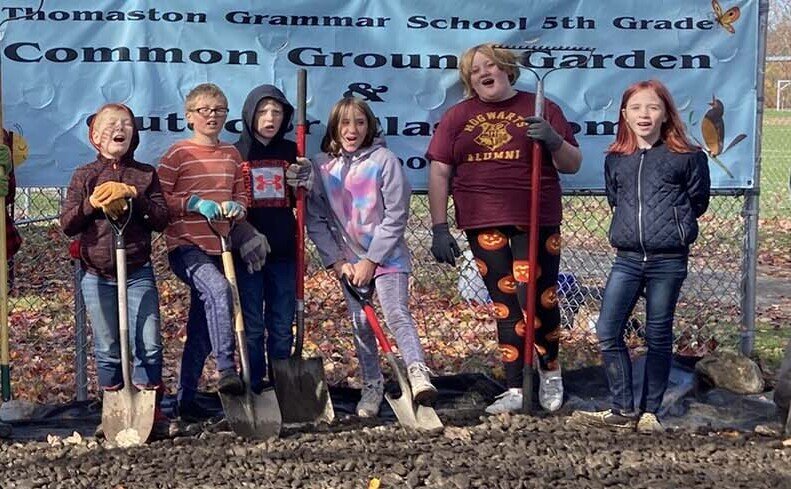The Maine School Garden Network is a group of committed individuals who believe in the profound importance of teaching children to garden, and the far-reaching value of adding a gardening curriculum to our schools. Hannaford has supported this nonprofit organization through the Hannaford Helps Community Bag and Bloomin’ 4 Good Programs.
Tell us about Maine School Garden Network.
The mission of the Maine School Garden Network (MSGN) is to promote and support educational gardens for youth and to encourage school programs that teach healthy eating and environmental stewardship. We’re a small organization with big ideas and benefit from the support of the Board of Directors, who are active in a number of partner organizations such as Maine Agriculture in the Classroom, Maine FoodCorps, Maine Farm and Sea to School Network, Maine Cooperative Extension and more!
What services do you provide to the community?
We provide support and resources for school garden coordinators and educators to establish and maintain school gardens and outdoor classrooms. We help them to learn how to finance, manage and teach in a school garden, including lesson plans. Anyone can sign up for our informative monthly newsletter with themes such as Classroom Management, Greenhouses and Grant Writing. Our website is full of resources and includes our Garden Directory, which currently has more than 190 school gardens ranging from those just getting started with a raised bed to gardens established 20-30 years ago covering a half-acre! Our Facebook page posts articles, announcements and opportunities on a timely basis. Our services are available not only to school gardeners and teachers but also to the community at large. All our events and programs are open to the public.
School gardens are not only used as a teaching tool but can provide produce for a local food pantry; some even have their own mini-farmers market! The school gardens also support the garden-to-cafeteria movement that has cropped up nationwide and is gaining traction here in Maine.

Maine School Garden Day is our signature one-day annual conference, held each May since 2005. This event provides topic-specific workshops, garden tours, networking opportunities and more for school garden volunteers, coordinators and educators. To be accessible to educators around the state, Maine School Garden Day is held in a different location each year.
School Garden Grown is a program that provides an opportunity for local schools to promote awareness of their great work and show off their school garden’s bounty at their local fair. MSGN encourages schools to enter their produce in agricultural fairs, and we work with volunteers and fair personnel to display stickers on their produce once exhibition hall judging takes place. Since 2016, we’ve seen over 500 School Garden Grown entries across fairs in Maine!
The biggest hurdle for a school garden is handling the summer season when schools are not in session. Our Program Organizer organizes School Garden Summer Tours around the state, with each location offering a chance to see school gardens in full bloom, learn different growing tips and techniques and exchange ideas to help keep school gardeners inspired while the students are on break.
We also support a program managed by an organization called ReTreeUs that specifically addresses the challenge of managing a school garden over the summer called the Back to School Gardens. This program aligns the school garden and the school year by having students plant vegetables in the spring that require very minimal maintenance over the summer and produce a great harvest when students return to school in the fall and then enables them to plant seedlings of greens sourced from organic farms to extend the season when they return in the fall.
What sets your organization apart from others in your community?
We have a specific niche in that we’re supporting school garden educators. No one else is doing exactly what we are, and we partner with like-minded organizations to extend our reach and pool resources. For example, Maine Agriculture in the Classroom does a lot with training teachers, but they have a more agriculture-wide focus. We collaborate with them because together, we’re getting a more significant impact.
We have a specific niche in that we’re supporting school garden educators. No one else is doing exactly what we are…
With competing interests in a school’s budget, it can be challenging to finance a paid garden educator position. Only about half of school garden coordinators are paid! Fortunately, we recently received two years of funding from the Sewall Foundation to offer an annual grant of $2,000 to each of five school gardens with our School Garden Caretakers Grant. Over the years, we noticed that many school gardens benefit from the continuity of a paid garden educator position. It can help increase recognition of the school garden program and elicit commitment from both the caretaker and the school.
Tell us a story that illustrates your organization’s good work.
The Outdoor Classroom at Central School in South Berwick started in 2005 and serves as a great example of a multi-faceted, community-based project that continues to evolve and make a difference in the education and health of its PreK-3rd grade students. Volunteer, staff and teacher initiatives are given valuable support from the school administration at every step of the way. Each year they continue to grow different crops to support diverse growing and harvesting experiences, connect the garden to the classroom and cafeteria and provide a vital space for outdoor exploration and play for their students!

It began with a series of landscaping projects in 2005 organized by a group of committed parents, including flower barrels, perennial gardens, shrubs and trees planted to enhance the landscape around the school. Then an Outdoor Classroom was created, which includes an orchard, garden and play space that nurture a relationship with the natural world and provide a connection to growing and harvesting food. Taste tests in the classroom encourage students to try new vegetables and were started in 2010 by Kathy Gunst, a James Beard award-winning food journalist and the Resident Chef for NPR’s Here and Now. The Planting of the Green tradition was started with a special visit from master gardener John Forti, author of the Heirloom Gardener, who planted rainbow Swiss chard, curly kale and over a dozen other “green” treats.
They celebrate the end of the growing season with a fall Harvest Festival where local chefs and parents work with every class and grade level for a week to create a full meal served at a school community dinner event at the end of the week. They also participate in Maine Agriculture in the Classroom events that support literacy and agriculture through the Read ME Agriculture program. Programs have included learning about maple syrup and honeybees and an all-school tomato planting event. Students planted pumpkins and sunflowers in May 2022 for harvest and exploration in the fall when the school community returned. In 2023, they organized an all-school planting of zinnias for students to take home to support the bee population.
A complete profile of this exciting program will be viewable on our website in late August.
What is your most outstanding achievement or contribution to the community?
It’s the fact that we serve as such a good resource for school gardens in Maine. For example, when school gardens register in our directory, we ask them to identify their most significant need. Recently, a new listing indicated their most significant need was to find funding for their new school garden coordinator to get more training. I immediately thought of several options, including free online training out of California, and wrote back immediately. Since they are new to the school garden world, they wouldn’t have known all the available resources. We help with referrals and can always point people in the right direction. We aspire to have a long-lasting effect and keep inspiring people and getting the information to them they need. Our program and event evaluations reinforce that we are meeting these needs!

What do you want people to know about Maine School Garden Network?
Our assistance is open to anyone, and we want to ensure school gardeners have what they need to succeed. Whether their learning style suits doing online study best, or they need the in-person contact from coming to an event and meeting some of their counterparts and getting inspired that way, we have something for everyone, even though we are a small organization.
Our assistance is open to anyone, and we want to ensure school gardeners have what they need to succeed.
While we are working hard to fund school gardeners and trying to help them get paid, we must raise every dollar we spend. The state does not fund us, nor do we exist under a parent organization. We’re always looking for support, whether from someone volunteering, joining our board, or donating. Every dollar counts with us and makes a difference!
How will you use the funds raised from the Hannaford Helps Community Bag and Bloomin’ 4 Good Programs?
We use them for operating expenses such as running our programs, maintaining our website and publishing our newsletter. We have been lucky to have been picked by multiple stores and appreciate the support given to us by Hannaford customers!
Is there anything you’d like to add?
I encourage people to go to our website and read all about us! There’s a lot of information and resources there about what’s going on in the school garden movement. I also want people to read the School Garden of the Month profiles; they’re so inspiring!
I want to leave you with this thought. A school garden is not just about cute kids playing in the garden. A school garden is a serious educational tool to teach children in a different way, using a learn-by-doing model. Instead of doing math on paper, they’re measuring things in the garden, counting actual things and making plans. They see that some things thrive and some things fail and what you have to do to try again and do it better. There are so many life lessons in the garden. Our students need time outdoors and in nature, away from their devices and screens. We are growing the next generation of stewards of the earth!

Published August 7, 2023.
